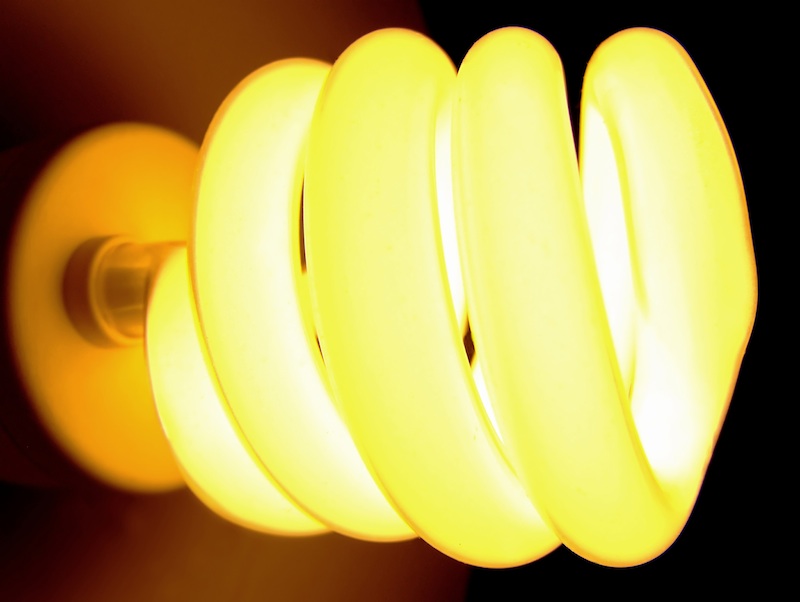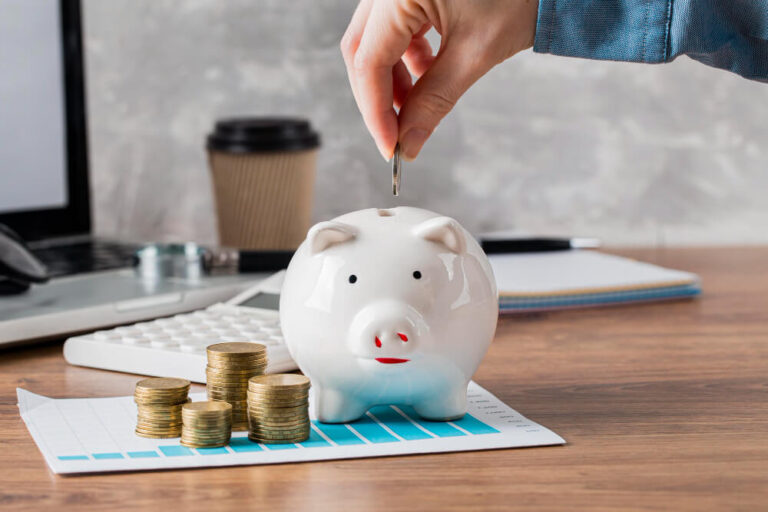For most households the electricity bill can sometimes eat up quite a chunk of the budget. This is why knowing few tricks to save money on electricity can clear up some cash each month, that can be further saved, spent to pay off remaining debt or just to have some fun.
1. Buy energy efficient devices – most of the modern devices are now energy-efficient. Start to replace the old ones, that probably use up too much electricity.
2. Choose a less expensive provider – if you have more than one provider, you’re in luck. This allows you to choose a better contract and pay less.
3. Monitor your energy use – a simple gadget can ‘show’ you how much you are using and where you can make savings.
4. Purchase devices that best suit your needs – don’t purchase huge washing machines or install an over-sized heating system. You would waste energy and money.
How to save money on energy: the lights
5. Turn off the lights, if you leave the room – simple as that. If you’re not there, don’t let the lights on.
6. Find the places where your lighting devices are most effective – by doing a bit of a planning, you can light a room with less devices and with better results.
7. Use the lights only when needed – if you can still find your way into the room and not need to turn on the lights, you can save money on electricity like that.
8. Paint the rooms in light colors – this helps reflect the light and provides the entire room with a brighter look.
9. Use table lamps – for someone who’s working at the desk, a table lamp makes more sense and bigger energy savings.
10. Buy LED or CFL light bulbs – they are a bit more expensive, but they last longer and help you save more energy than incandescent lights.
11. Use the Christmas lights at night – during day, you can’t see them, so make sure to turn them on when the night falls and then off when you go to sleep.
12. Don’t overdo your Christmas lighting – you don’t need to have the most lights during Christmas. Showing off in your neighborhood will also cost you a lot.
13. Turn off the porch light once you get home – since no one needs it anymore, just turn it off, as soon as you are inside.
14. Keep the porch light off – if you have some decent lighting from the street lights, no need to use more electricity just to turn on your own porch lights.
15. Use ceiling floodlights only if they are LED – this will allow to still light the room and not use up too much energy.
16. Halve your lights – unscrew every second light bulb in your house and see if you can do without them.
17. Install motion sensors – they will turn on and off the lights based on the room occupancy. This way you’ll never forget your lights on anymore.
18. Don’t watch TV with the lights on – I’ve noticed that many people have the lights on when watching TV. Turn them off, they’re really not needed.
19. Turn off the TV when you are not watching – I have personally known people who love to have it on just as a background noise. It’s annoying and will make your electricity bill bigger.
20. Watch less TV – many people are starting to organize their leisure time better and stopped including the TV shows in it. Spend time with your family, read, work out.
21. Unplug the devices you are not using – just keeping them turned off still uses up electricity, unless you have a switch on the power strip.
22. Unplug the chargers – after you have your phones and tablets charged, it’s time to unplug the chargers. Leaving them plugged with continue to use up energy.
23. Turn off your computer – don’t let it in ‘idle’ mode, shut it off completely. Saves power and makes the computer last longer.
24. Optimize the energy use for your PC – most computers have various power settings. Choose the one that helps you save more energy and also work comfortably with it.
25. Use a fan only when in the room – since it’s not air conditioning, the fan will make you feel ‘cooler’ only when you’re there. If you left the room, it will just use up electricity.
26. Turn off your home office – if you are working from home and have an office area, make sure all the devices are turned off, when not needed.
27. Keep fax on sleep mode – if you need to use one, you can keep it in sleep mode. This way you can still receive faxes and save up on energy.
28. Don’t use the garage door, unless needed – many people use the garage door instead of the main one, since it’s more convenient. Unless you do need to use the garage, using the main door will not use any energy, thus saving you money.
29. Turn off the appliances when leaving the house – of course, those that can be turned off and don’t need to run when you are not at home.
30. Only dehumidify when needed – don’t use a dehumidifier based on the season you are in, use it if really needed.
31. Double check if everything is properly turned off – before going to be, double check to see if you haven’t left anything on.
How to save money on electricity: the cooling devices
32. Keep cooling devices where it’s .. cool – a very simple trick that would allow your freezer (or any other cooling device) to work properly and not have to also compensate for too much sunlight / heat coming its way.
33. Keep cooling devices at least 2 inches from the wall – this way the air can flow properly and your devices will work at full potential.
34. Let the food cool down before placing it in the fridge – it does take a while, but placing hot items in the fridge won’t help too much either.
35. Let food defrost in the freezer – it will help it cool down the fridge and this will save money on electricity.
36. Make sure the refrigerator seals are still intact – over time they wear out, so, if you notice any issues, change them.
37.Keep the fridge and freezer clean – defrost when needed and also vacuum the condenser coils behind the appliance.
38. Don’t keep the fridge open too much time – take what’s needed from it and just close the door. Any minute you leave the door open will cost you money.
39. Keep cooling devices 3/4 full – but don’t overfill your fridge or freezer, they still need to circulate the air.
40. Take the food at once, so that the fridge’s door doesn’t open too often – if you’re preparing a meal, get your ingredients from the refrigerator at once. Opening the door less will help you save energy.
41. Increase the temperature in the cooling devices – 7°C (45°F) is enough for the refrigerator and -18°C (0°F) is enough for the freezer.
42. Keep your cooling devices tidy – label the food, make sure you can get it out as fast as possible, thus minimizing the time you keep the door open.
43. Unplug the second fridge – chances are you have one for beers and other drinks. If it’s not in use, unplug it.
44. Don’t keep second freezer / fridge – as long as you can buy almost anything frozen / cold from the store, when needed, there’s no reason to keep a second cooling device at home.
How to save money on electricity: the washing machine
45. Wash at smaller temperature – if the clothes are not that dirty, there’s no need for higher temperatures. 30°C would suffice.
46. Connect it to the hot water pipe – it will use the hot water instead of having to warm it itself.
47. Run full loads of laundry – this way you also have fuller dryers.
How to save money on electricity: the dishwasher
48. Hand-wash the dishes – sure, if you have a big load of dirty dishes, you’ll probably get better results with the dishwasher. But few dishes can be washed by hand and this would save money on electricity.
49. Clean the dishwasher drain – if it’s clean, there are no chances for the dishes to get soiled and need to be re-washed.
50. Use a lower temperature – just as with washing clothes, dishes can be washed with water that’s not that hot.
51. Stop the dishwasher drying the dishes – use it to clean the dishes, then let them dry naturally.
52. Soak the dishes – before putting them into the dishwasher, soaking them in detergent will allow you to run the machine on the energy saving program and still get clean dishes.
53. Fill up the dishwasher – don’t run it unless it’s well filled with dishes. This way you’ll not use it as often and get the best results.
How to save money on electricity: the dryer
54. Keep dryer lint trap clean – a clean lint trap allows for the moisture to leave the dryer faster and save you money.
55. Check the clothes before the end of the cycle – sometimes they get dried faster than the cycle time, this allows you to remove them and turn off the dryer sooner.
56. Use a laundry line – if you have some space outside, use a line and dry your clothes.
57. Set an indoor drying area – a simple drying ‘rack’ can save you a lot of energy.
58. Untangle the clothes for the dryer – just by separating and untangling them you are helping the dryer be more efficient.
59. Untangle the clothes during the drying cycle – even if you placed them untangled, you should check them during drying. Untangle again and help the dryer become more efficient.
60. Clean the dryer’s filters often – dirty filters prevent the air from properly flowing and the clothes take longer to dry.
61. Don’t overfill the dryer – while it makes sense to push everything inside (to run one cycle only), if the dryer is loaded too much, the clothes won’t dry properly and you’ll also use up more energy.
62. Get a dryer with moisture sensor – this allows it to sense if the clothes are dry and will end the cycle sooner.
63. Do consecutive loads of laundry – a well heated dryer will use less energy than one that needs to get the heat up from cold again.
64. Don’t completely dry the clothes in the dryer – even if they are a bit damp, they can be hanged up to dry naturally.
How to save money on electricity: the air conditioner
65. Service your air conditioner once a year – keep it clean, straighten fins, lubricate the motor or change the filters. This will ensure peak efficiency and less money spent on electricity.
66. Ventilate during the night and early morning – not only it will help you freshen up the air, but it will help store the coolness during the day.
67. Use the air conditioner only when needed – you don’t need to run it the entire summertime, make sure you put it to good use only when really needed.
How to save money on electricity: the stove and oven
68. Get a gas stove if possible – cooking with electricity can be pretty expensive, so, if you can secure a gas stove, choose that instead.
69. Use pots with the right diameter compared to the hobs – the hobs should be smaller or a perfect fit.
70. Keep the lid on – cooking with the pot’s lid off will lose up to 2/3 of the energy.
71. Try to use less water – when cooking, try to use less water, if possible.
72. Preheat the oven only when mandatory – some recipes work well without preheating the oven.
73. Turn off the stove 5 minutes before the meal is ready – the stove is already hot, so 5 minutes won’t matter for your recipe, but will save you energy and money.
74. Boil water with an electric kettle – don’t use the stove for something like this, you’ll use more electricity than with a kettle.
How to save money on electricity: the heating system
75. Turn the heat down, not completely off – many consider that, if they are not at home, it’s good to turn off the heating. Heating a cold room uses up more energy, so, turn the heat down a notch, not completely off.
76. Open the shades during the day and close them at night – a room will heat nicely if under direct sunlight, but it will also ‘leak’ heat during the night, because of the windows. Use your shades smartly and save energy.
77. Try to avoid heating with electric energy – if possible, avoid electricity when it comes to heating up your house.
78. Use a thermostat – this helps you program it wisely and save money with the energy.
More tips on how to save money on electricity
79. Use a manual can opener – no need to use electricity for something that takes you few seconds even with a manual can opener.
80. Have bread, not toast – this would save power, since toast does use electricity to get prepared.
81. Seal the windows and doors – most modern doors and windows are properly sealed, but, if you notice any draft, seal them better.
82. Air dry your hair – if it’s not too cold at home, dry it with the towel and then leave to dry on its own.
83. Use manual tools when gardening – you can trim the bushes with manual shears instead of electric trimmers.
84. Use power tools only when needed – there are manual tools that help you do the same job.
85. Use one charger for your cordless phones – even if you do have more phones at home, they don’t need to get charged at once, so charge them on rotation.
86. Take the garbage to the bin – even if you have a garbage disposal system in your sink, there’s no need to use it that often.
87. Disconnect the microwave light – if possible, you can remove it and save on energy.
88. Shovel snow by hand – a snow blower uses a lot of energy, you can save it and get a good workout by shoveling snow on your own.
89. Collect the leaves manually – again a great workout session and energy saving strategy.
90. Use few power boards – the fewer the better, since this way you won’t forget to turn them off.
91. Keep your light bulbs clean – dust can set on them and prevent the light to properly shine. Just keep the lighting appliances clean and it will keep your house better lit (so no need to turn on even more lights).
92. Iron clothes only when needed – if you hate to iron clothes, here’s a great reason to not do it: it uses up electricity. Iron only the clothes that really need it and skip it for the rest.
93. Computer on standby – if you are inactive during the day (and not that much to warrant a system shutdown), let the computer enter standby, once you are inactive for a while.
94. Romantic candlelight dinner – you don’t have to do it every night, but it can warm up the ‘air’ and also help you save on energy.
95. Make good use of the low temperatures – if it’s freezing where you leave, you can set some special areas outside your house to keep the food that needs to stay cool. Even if you get to unplug the freezer for few days, it’s still worth the effort.
96. More plants – they make the house look even more appealing and block the sunlight from directly going into your home.
97. Adjust the fan speed – if you live in a dry area, you will need the fan to run fast, but otherwise you can still keep cool and save energy.
98. Make your own electricity – while not suitable for every household, this would help you become more self-sustaining and save money on electricity.
99. Descale your kettle regularly – keeping it clean ensures maximum efficiency.
100. Use a solar cooker – will need sunlight and cook your food without needing any other form of energy (so no electricity either).








